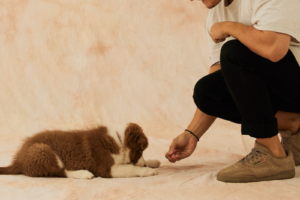What is dog socialisation? Why is it so important, and how can you properly socialise your dog or puppy using the correct approach? Let’s dive deeper into the subject where we will explain the basics and why this is such an important process.
Socialisation is a critical part of raising a well-behaved, confident, and happy dog. Introducing your dog or puppy to various experiences, environments, people, and other animals is essential for their mental and emotional development. This process should begin as early as possible, ideally as soon as your dog has completed their vaccines. Here’s everything you need to know about puppy socialisation and how to effectively socialise your furry friend.

What is Dog Socialisation?
Dog socialisation is a process of exposing your dog to a wide range of experiences and situations, such as meeting other dogs, people, and animals, exploring new environments, and encountering everyday objects like cars or bicycles. This process helps dogs develop positive behaviours and adapt comfortably to the world around them, reducing fear or anxiety in new situations. It’s a vital part of any comprehensive dog training plan.
Why is it So Important?
Socialisation plays a pivotal role in raising a dog that is friendly, confident, and adaptable. Key reasons why socialising puppies and dogs is essential include:
- Prevents Anxiety and Aggression: Dogs that are not socialised may develop fear, aggression, or phobias. Early exposure helps prevent these issues.
- Encourages Positive Interactions: Socialised dogs are more likely to interact calmly with other dogs and people.
- Improves Training Success: Well-socialised dogs are more focused and easier to train in obedience and behaviour.
- Enhances Quality of Life: Dogs that are comfortable in new settings enjoy a broader range of activities, such as visits to the park or dog-friendly cafes.
When to Start Socialising Puppies

As you are preparing your home for a new puppy and working on housebreaking, socialisation should ideally begin right away. This is about when your puppy is 8–12 weeks old, immediately after completing their vaccines. This is a critical period for puppy training when they are most receptive to new experiences. However, socialisation is not just for puppies—older dogs can also benefit from gradual and positive socialisation.
How to Socialise a Dog or Puppy
To properly socialise your dog, focus on key areas that promote confidence and calm behaviour:
- Introduce New Environments: Take your dog to parks, markets, busy streets, and quiet countryside locations to familiarise them with different settings.
- Meet People of All Types: Expose your dog to adults, children, and individuals with varied appearances, such as those wearing hats, carrying umbrellas, or in wheelchairs.
- Interact with Other Dogs: Supervised play with well-socialised dogs helps your puppy or dog learn social cues and develop good manners.
- Expose to Everyday Objects: Show your dog household items like vacuum cleaners or hairdryers, as well as outdoor objects like bicycles or skateboards.
- Experience Common Situations: Practise scenarios such as visiting the vet, travelling in a car, or being groomed to reduce anxiety.
Socialising Older Dogs

If you’ve adopted an older dog, it’s not too late to start socialisation. While it may take more time and patience, the following steps can help:
- Begin with calm, quiet environments before progressing to busier areas.
- Use positive reinforcement techniques to reward calm behaviour. Use their food drive as a tool to achieve wanted behaviour- a tasty treat is hard to say no to.
- Gradually introduce other dogs, ensuring interactions are controlled and friendly.
Tips for Success:

- Reward Positive Behaviour: Use treats, praise, and affection to create a positive association with new experiences.
- Take It Slowly: Avoid overwhelming your dog with too much too soon.
- Be Consistent: Regular exposure to different settings and interactions is key.
- Watch Body Language: Look for signs of stress, such as tucked tails or excessive panting, and adjust your approach as needed.
The importance of socialisation lies in exposing your dog to a variety of objects, people, and situations, helping them perceive these as normal and remain calm and confident. A well-socialised dog is less likely to develop anxiety or fear, which can lead to misbehaviour and problematic behaviours. Confidence and calmness also make a dog more focused, enabling them to excel in training sessions faster. Learn more about socialisation and similar topics in the Eduaction and Theory program in the Dogit App. Download and sign up for free today to explore our app.

WEEKLY NEWSLETTER
Lorem ipsum dolor sit amet consectetur. Viverra sed eleifend at nibh fermentum. Tortor imperdiet penatibus aliquam lorem pellentesque.



